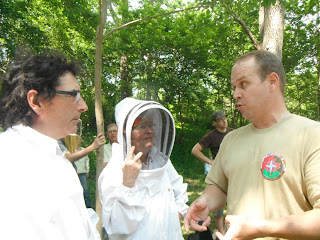
Below is a list of beekeepers in the Oxford, Middlesex and Elgin counties in southwestern Ontario who will collect honey bee swarms or do hive removals.
Before you contact them, please read this article on
Swarms to be certain what you think might be honey bees are actually honey bees.... No sense wasting your time and theirs if they're not bees.
If calling a pest removal agency ask if they will collect the bees to put in a hive or terminate them.... I hope you opt for collection.
Many beekeepers will take a swarm because it's a great way for them to get free bees. Bees are under great stress these days so I hope you opt to put the can of Raid away and let someone take the bees.

There are many types of insects that may look like honey bees that can take up residence in an attic, garage, a backyard barbeque or bird house. These insects could be wasps, hornets or other kinds of bees.
Honey bees have gold and brown stripes and are furry. They also build a wax honeycombs that can hang down from a surface. The combs [pictured above] look like double-sided rounded waffles. Honey bees don't build nests in the ground and are more likely to select a sheltered location such as a hollow tree or attic of a home.
[This honey bee has pollen attached to her back leg].
Most beekeepers will have a service charge for attending a call which usually only covers the cost of their gas to get there. Often there will be a charge regardless if the insects are honey bees or not.
If in doubt, why not email them photos? Or simply observe the nest/swarm for a few minutes and compare with the photos on this page. Are they coming and going with pollen on their back legs? If so, they will be bees... but which kind? They could be honey bees, bumble bees or carpenter bees, etc.

Wasps, bumble bees and hornets do not make honeycombs. Their nests are made from various materials such as mud or wood scrapings (paper wasps). Wasps are not hairy and both hornets and wasps can sting multiple times whereas a honey bee dies when she stings.
One of the most common hornets is the
Bald Faced Hornet [pictured at left] which is white and black and quite large. These wasps build paper nests that hang from an object. The nests start small but then grow quite large - bigger than a basketball. They do have a few hairs on their body but no where near as many as a honey bee.
Wasps and hornets do not collect pollen and bring it back to their hives attached to their back legs - only bees do that.
 Yellow Jacket Wasps
Yellow Jacket Wasps are about the same size as honey bees and are common pests at fairs and picnics. Wasps and hornets are omnivores and will eat both your tuna sandwich and your sugary pop. Yellow jackets primarily nest in the ground. In the fall they tend to become more aggressive as food becomes more scarce and they sting more frequently.
Bumble bees [pictured below next to a honey bee] are the gentle giant fuzzy bees. They are very docile and not inclined to sting.
They make small wax pots to store small quantities

of nectar. They primarily nest under ground in old mole tunnels. I'm happy to have a nest of them under my dog house. They help to pollinate the flowers in my garden and have never been a problem.
Bumble bees collect pollen as well and will attach it to their back legs, just like honey bees.
If you see a bee
Swarms you can just leave them alone. They have a plan and they know what they're doing--they're house hunting and they know what they're doing.
Once they find a new home they'll leave as a mass. They'll fly off in anywhere from a couple hours to a few days. The best thing to do is simply leave them alone.
Watch an amazing swarm video for fascinating details about a honey bee swarm.
If you have bees or another insect in your residence that need to be removed, be aware that many pest companies will only come and terminate the current nest of insects. If the insects' entry way into your home isn't closed off, within a short period of time more insects will move in. Repairing or closing off the entrance is the only way to ensure they don't return.
Thank you for caring enough about bees to take the time to read about them. I hope you opt to have the bees collected by a beekeeper.
List of Beekeepers Who Collect Swarms in Ontario:This is a list of
beekeepers in southwestern Ontario who will collect swarms.
If you have bees in an attic, garage, etc., or have a swarm you can find beekeepers who will collect them by checking with the bee clubs/associations for that province or state. I have a few of them listed on my web site
Associations page.
Sometimes people will sign up to the beekeeping Yahoo group and post a message for help as well. They're also listed on the Associations web page.
 Every year in June the "MOE", Middlesex Oxford, Elgin Beekeeper's Association (moebee.com) meet at a beekeeper's yard.
Every year in June the "MOE", Middlesex Oxford, Elgin Beekeeper's Association (moebee.com) meet at a beekeeper's yard. [Photo - my Mom holding a frame of bees.]
[Photo - my Mom holding a frame of bees.]









 With a little Googling around the internet and a couple emails, I was able to find out where and when the local beekeepers in my area meet.
With a little Googling around the internet and a couple emails, I was able to find out where and when the local beekeepers in my area meet.

